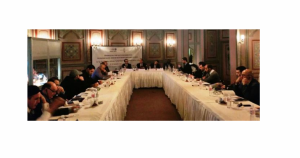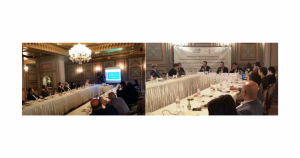On 27-29 January 2015, No Peace Without Justice, with the support of the Kawakibi Democracy Transition Center (KADEM), organised a training on “Promoting the ICC’s contribution to democratic and human rights reform in Libya“, which was held in Hammamet, Tunisia.
Presenters of the 3-day training included Fadi El Abbdallah, ICC Spokesperson and Head of Public Affairs Unit, Amady Ba, Head of International Cooperation at the ICC Prosecutor’s Office, as well as experts from Libya and Tunisia. The training engaged 20 Libyans lawyers and representatives of civil society and the media, who have been selected for their critical role in promoting judicial and legal reform to support accountability and redress for victims, in monitoring trials and in reaching out to the Libyan population, including victims and affected communities.

The overall goal of the training was to reinforce the knowledge of Libyan civil society actors on the mandate, rules and procedures of the ICC. It will enhance their expertise on the links between the ICC principle of complementarity and the Libyan judicial system, including on the current status of the Libyan cases before the Court and their interconnections with the ongoing national trials against top leaders of Muammar Gaddafi regime. The training also aimed to strengthen the capacity of the target groups to organise ICC-related activities to engage effectively the population, particularly victims and affected communities, through communications and outreach activities.
As Libyan institutions remain weak, it is critical to reinforce the understanding of these target groups, which carry weight and respect within Libyan society, about how the ICC works and the potential role it can play in supporting accountability and redress for victims in Libya. The ICC indictments issued while the conflict was ongoing were an important element in denying authority and legitimacy to the previous regime and offered hope that Libyans would one day receive justice and redress. With the end of the revolution and the new Libyan authorities proclaiming a new respect for human rights, including seeking to prosecute alleged perpetrators, the ICC can continue to play such important role, by acting as a catalyst for transformation of the Libyan judicial system as a whole, so judicial reforms can be grounded on international standards and principles.

Documentation:
- Final Report of the training course
- Concept paper of the training course
- Program of the training course
NPWJ project on Libya
NPWJ has been working on the Libyan transition since early 2011, in the framework of its project to support Libya’s democratic transition through justice and accountability. As the country embarks on legislative reforms, the Libyan authorities can break with the legacy of impunity and abuses that typified Gaddafi’s rule with a new respect for the rule of law and a commitment to restoring justice and dignity to victims. Doing so requires not only the investigation and prosecution of the crimes and violence perpetrated during the revolution, but also efforts to confront a history of oppression and human rights abuses that dates back decades under the rule of the former regime.
For further information, please contact Nicola Giovannini (Press & Public Affairs Coordinator) on ngiovannini@npwj.org or +32-2-548-3915![]() +32-2-548-3915.
+32-2-548-3915.
For further information on the activities of NPWJ in Libya please contact Giulia Cappellazzi on gcappellazzi@npwj.org.




